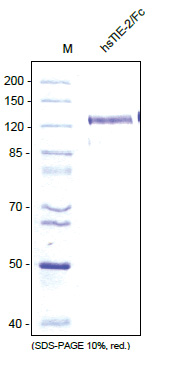CD202b / TEK (Fc Chimera) Human Protein
Other products for "TEK"
Specifications
| Product Data | |
| Species | Human |
| Expression Host | Insect |
| Predicted MW | 250 kDa |
| Purity | >90% by SDS-PAGE and visualised by silver stain |
| Presentation | Purified |
| Buffer | Presentation State: Purified State: Lyophilized purified protein Buffer System: PBS without stabilizers |
| Bioactivity | Biological: Measured in a functional ELISA assay. When TIE-2/Fc is immobilized at 4 μg/mL (100 μl/well), it binds rh Angiopoietin-2 with a linear range of 2-100 ng/ml. |
| Endotoxin | < 0.1 ng per µg sTIE-2/Fc. |
| Reconstitution | Restore in PBS or medium to a concentration not lower than 50 µg/ml. The lyophilised sTIE-2/Fc is soluble in water and most aqueous buffers. |
| Preparation | Lyophilized purified protein |
| Protein Description | Recombinant Human soluble TIE-2/Tek was fused with the Fc part of Human IgG1. The recombinant mature sTIE-2/Fc is a disulfide-linked homodimeric protein. The sTIE-2/Fc monomers have a mass of approximately 125 kDa. The soluble receptor protein consists of the full extracellular domain (Met1-Val730). Result by N-terminal sequencing: AMDLILINSL |
| Note | Centrifuge vials before opening! |
| Storage | Store lyophilized at 2-8°C for 6 months or at -20°C long term. After reconstitution store the antibody undiluted at 2-8°C for one month or (in aliquots) at -20°C long term. Avoid repeated freezing and thawing. |
| Stability | Shelf life: one year from despatch. |
| Reference Data | |
| RefSeq | NP_000450 |
| Locus ID | 7010 |
| UniProt ID | Q02763, Q59HG2 |
| Cytogenetics | 9p21.2 |
| Synonyms | CD202B; GLC3E; TIE-2; TIE2; VMCM; VMCM1 |
| Summary | This gene encodes a receptor that belongs to the protein tyrosine kinase Tie2 family. The encoded protein possesses a unique extracellular region that contains two immunoglobulin-like domains, three epidermal growth factor (EGF)-like domains and three fibronectin type III repeats. The ligand angiopoietin-1 binds to this receptor and mediates a signaling pathway that functions in embryonic vascular development. Mutations in this gene are associated with inherited venous malformations of the skin and mucous membranes. Alternative splicing results in multiple transcript variants. Additional alternatively spliced transcript variants of this gene have been described, but their full-length nature is not known. [provided by RefSeq, Feb 2014] |
| Protein Families | Druggable Genome, ES Cell Differentiation/IPS, Protein Kinase, Transmembrane |
Documents
| FAQs |
| SDS |
Resources
Recombinant Protein Resources |
{0} Product Review(s)
0 Product Review(s)
Submit review
Be the first one to submit a review
Product Citations
*Delivery time may vary from web posted schedule. Occasional delays may occur due to unforeseen
complexities in the preparation of your product. International customers may expect an additional 1-2 weeks
in shipping.






























































































































































































































































 Germany
Germany
 Japan
Japan
 United Kingdom
United Kingdom
 China
China
